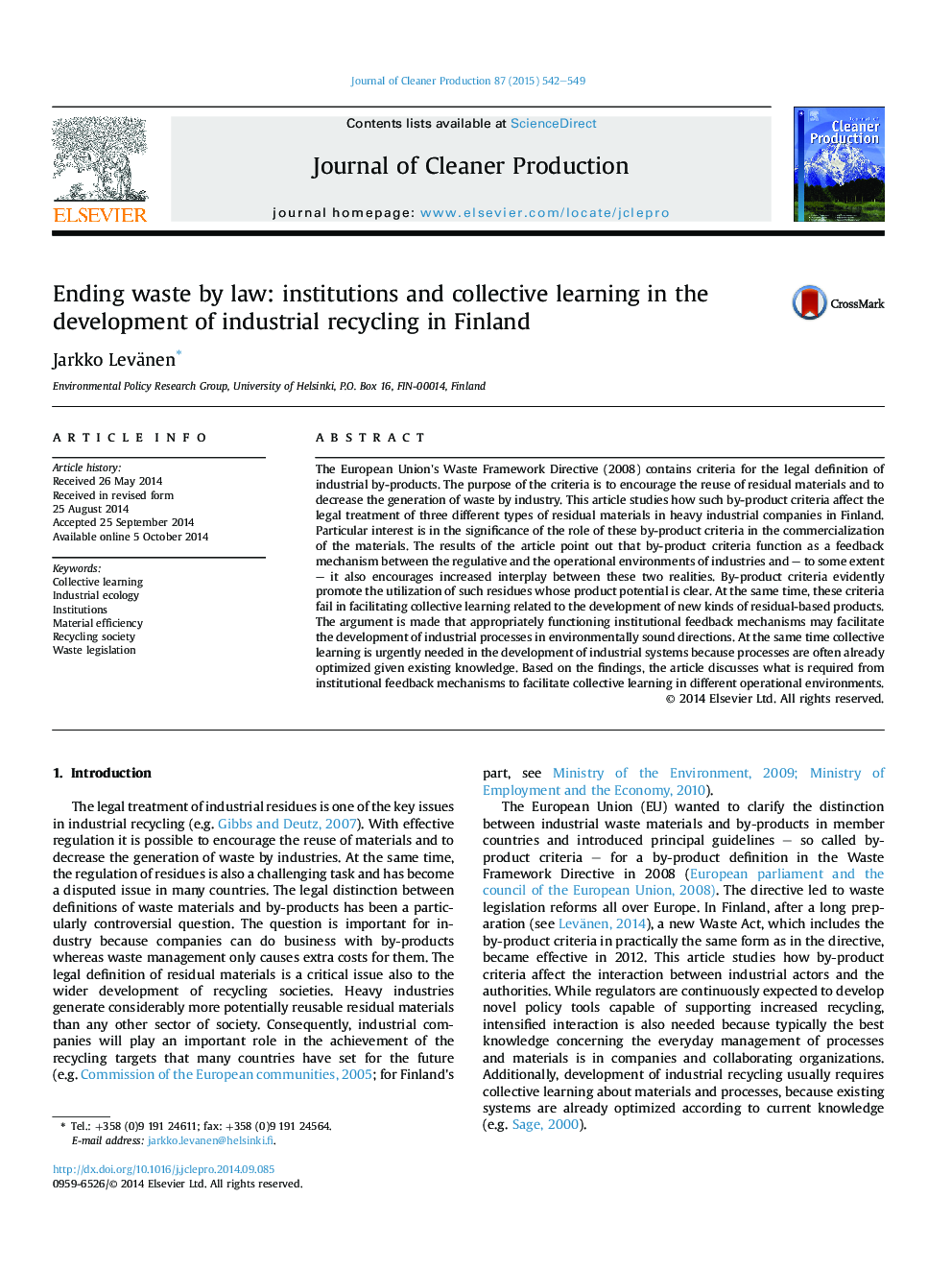| کد مقاله | کد نشریه | سال انتشار | مقاله انگلیسی | نسخه تمام متن |
|---|---|---|---|---|
| 8105253 | 1522159 | 2015 | 8 صفحه PDF | دانلود رایگان |
عنوان انگلیسی مقاله ISI
Ending waste by law: institutions and collective learning in the development of industrial recycling in Finland
ترجمه فارسی عنوان
اتمام زباله توسط قانون: موسسات و یادگیری جمعی در توسعه بازیافت صنعتی در فنلاند
دانلود مقاله + سفارش ترجمه
دانلود مقاله ISI انگلیسی
رایگان برای ایرانیان
کلمات کلیدی
یادگیری جمعی، محیط زیست صنعتی، موسسات، بهره وری مواد، جامعه بازیافت قوانین زباله،
ترجمه چکیده
دستورالعمل چارچوب اختراعات اتحادیه اروپا (2008) حاوی معیارهای تعریف قانونی محصولات جانبی صنعتی است. هدف از معیارها تشویق مجدد استفاده از مواد باقی مانده و کاهش تولید زباله توسط صنعت است. این مقاله بررسی می کند که چگونه چنین معیارهای فرعی بر رفتار حقوقی سه نوع مختلف مواد باقی مانده در شرکت های صنعتی سنگین در فنلاند تأثیر می گذارد. علاقه خاصی به اهمیت نقش این معیارهای کالا در بازاریابی مواد است. نتایج این مقاله نشان می دهد که معیارهای فرعی محصول به عنوان مکانیابی بازخورد بین محیط های نظارتی و عملیاتی صنایع و تا حدی نیز باعث افزایش تعامل بین این دو واقعیت می شود. معیارهای محصول به وضوح استفاده از بقایایی را که پتانسیل محصول روشن است، ترویج می کند. در عین حال، این معیارها در تسهیل یادگیری جمعی مربوط به توسعه انواع جدیدی از محصولات باقی مانده شکست می خورند. استدلال می شود که مکانیزم های مناسب بازاریابی سازمانی ممکن است توسعه فرایندهای صنعتی را در جهت زیست محیطی راحت کند. در عین حال یادگیری جمعی در توسعه سیستم های صنعتی ضروری است، زیرا فرآیندها اغلب به علت دانش موجود بهینه سازی شده اند. بر اساس یافته های این مقاله، از مکانیسم بازخورد سازمانی برای تسهیل یادگیری جمعی در محیط های عملیاتی مختلف مورد بحث قرار می گیرد.
موضوعات مرتبط
مهندسی و علوم پایه
مهندسی انرژی
انرژی های تجدید پذیر، توسعه پایدار و محیط زیست
چکیده انگلیسی
The European Union's Waste Framework Directive (2008) contains criteria for the legal definition of industrial by-products. The purpose of the criteria is to encourage the reuse of residual materials and to decrease the generation of waste by industry. This article studies how such by-product criteria affect the legal treatment of three different types of residual materials in heavy industrial companies in Finland. Particular interest is in the significance of the role of these by-product criteria in the commercialization of the materials. The results of the article point out that by-product criteria function as a feedback mechanism between the regulative and the operational environments of industries and - to some extent - it also encourages increased interplay between these two realities. By-product criteria evidently promote the utilization of such residues whose product potential is clear. At the same time, these criteria fail in facilitating collective learning related to the development of new kinds of residual-based products. The argument is made that appropriately functioning institutional feedback mechanisms may facilitate the development of industrial processes in environmentally sound directions. At the same time collective learning is urgently needed in the development of industrial systems because processes are often already optimized given existing knowledge. Based on the findings, the article discusses what is required from institutional feedback mechanisms to facilitate collective learning in different operational environments.
ناشر
Database: Elsevier - ScienceDirect (ساینس دایرکت)
Journal: Journal of Cleaner Production - Volume 87, 15 January 2015, Pages 542-549
Journal: Journal of Cleaner Production - Volume 87, 15 January 2015, Pages 542-549
نویسندگان
Jarkko Levänen,
